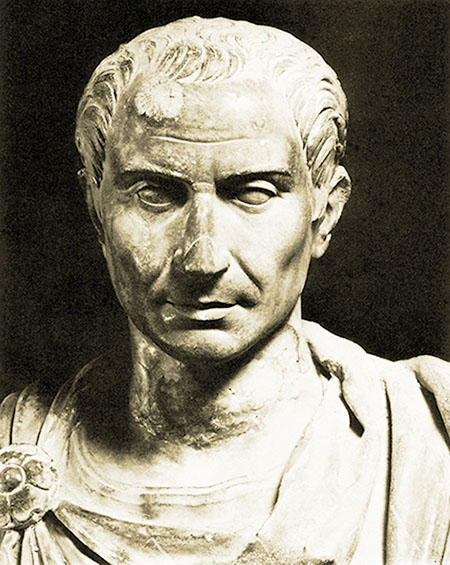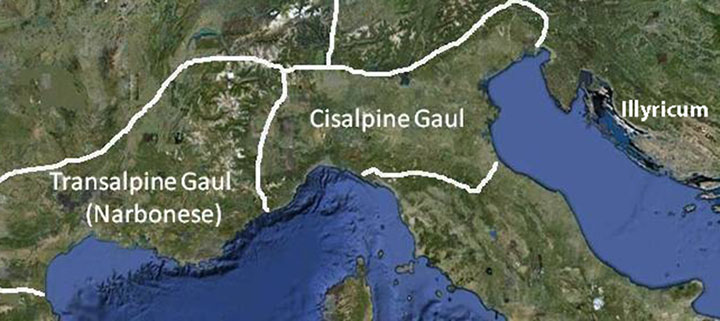In the battle against Catiline, nobility and knights were united. The Senate regained its earlier importance. In the next period, Senate was shown as the guardian of the aristocratic elements in Roman Republic and traditional Roman libertas (freedom). An ideologist of that thinking was Cicero.
Marcus Porcius Cato the Younger was very important figure for Optimates. He was a supporter of the tradicinal Roman Republic and Stoic philosophy. His ideal was Marcus Porcius Cato the Elder.
Crassus temporary withdraw from politics after the Catiline’s defeat, while Caesar acted on behalf of Pompey. Again in Rome there were riots and the Senate declared a state of emergency.
However, mostly thanks to Cato intervention, Caesar plans have not complited. In Rome, peace was restored, but many people were afraid of Pompey’s return. People were afraid that Pompey could gain power like Lucius Cornelius Sulla by relying on his military. After completion of the praetorian position Caesar got the duty in Spain. His many creditors refused to let him leave Rome until he paid off huge debts. He managed to go in Spain with the Crassus financial help and guarantee.
Pompey’s position after his return to Italy
In 62 BC, Pompey’s fleet arrived in Brindisi. Despite every expectation Pompey dismissed his troops. Pompey did not enter into Rome, because he expected triumph and he expected that his war glory will ensure supremacy in the Roman Republic. Pompey had in mind that if he had gained power, optimates will not like that. In December, 61 BC (exactly one year after he returned to Rome) Pompey celebrated great triumph. However, the Senate rejected his candidacy for the consulate, as well as his request for unconditional confirming of all his measures in the East. Agrarian Law proposed by tribune Lucius Flavius did not passed. This Law proposed that Pompey’s veterans receive some land for military successes.
Gaius Julius Caesar – Short facts



Many magistrates originated from the patrician genus of Julians. Caesar’s mother belonged to the plebeian genus of Aurelius. Caesar spent several years in Asia and after Sulla’s death he returned to Rome. Caesar was on the side of the populares. He spent huge amounts of money to acquire popularity. In 68 BC, Caesar became a Quaestor. In the eulogy for his aunt Julia and his wife Cornelia he glorified Julians. At the same time, Caesar glorified the leaders of populares – Gaius Marius and Lucius Cornelius Cinna. In 67 BC and 66 BC Caesar defended the Law of Gabinius and Manilius. During those years, he was a supporter of bringing closer in alliance with Pompey and Populares. However, during his campaign to the East, he got closer to the Crassus. In 65 BC, Crassus was censor while Caesar was aedil.
In 60 BC, Caesar returned to Rome from Spain. For the short time of his government in Spain, Caesar managed to conquer Lusitanians, to rebuild ruined economy of the province and his finances. Caesar returned to Rome as a rich man. In front of the Rome Caesar expected triumph since he fought to set up in the absence his candidacy for the consulate. This provokes a reaction by the Senate. However, Caesar renounced triumph, came to Rome and personally participated in the elections for the consul. He elected as consul in 59 BC.
Alliance between Caesar, Pompey and Crassus
Caesar knew how to take advantage of the political situation and reconcile Pompey with Crassus. These two were, up until then, in mutual dispute. Three powerful men in Rome (Pompey, Caesar and Crassus) entered in an unofficial (private) alliance with the obligation to help one another. In history, this alliance is known as the first triumvirate. The most influential triumvir was Pompey, because of military glory and support of his soldiers which were dismissed to their homes. One of the main aims of the alliance was the realization of Pompey’s demands, which the Senate did not fulfil.
Caesar was popular among the plebs, since he in the past was famous for renewing of the Marius party. Each of them had friend among nobles and highly developed clientele (in client relationships with them were whole cities – both in Italy and in the provinces). The triumvirate was strengthened through dynastic marriages. Pompey married Caesar’s daughter Julia, Caesar married Calpurnia, which was daughter of one prominent triumvirate supporter.
Senators did not like this alliance and they were very hostile towards it. A supporter of Senator Marcus Terentius Varro issued a satire called “Three-headed monster”. Marcus Porcius Cato vigorously fought against them.
In the beginning alliance between Caesar, Pompey and Crassus was kept secret. However, the Senate was powerless when it comes to the triumvirate. In 59 BC, Caesar as Consul implemented two agrarian Laws. The land plots were given to 20.000 people, mostly to Pompey’s veterans, poor citizens with at least three children. The Senate harshly reacted on this decision, and they decided to present the problem to the National Assembly. Caesar did not pay much attention on protest of tribunes. In order to implement the Law, a committee of 20 persons was chosen (20 senators including Cicero). Senators were under pressure and they had to let agrarian Law pass.
A special Law confirmed Pompey’s actions in the East. It was also reduced a total sum of taxes in Asia. Because of Crassus and his knight friends, it was conducted the Julius Law on extortion, which increased the penalty for extortion in the provinces and competition to the provincial governors, was made more specific…



According to the Law of tribune Publius Vatinius, Caesar received the provinces Cisalpine Gaul and Illyricum in service for five years and also he received broad extraordinary authorization and the right to mobilize an army of two legions (approximately 3000 soldiers per legion) . Caesar service of five years and the authorization in Roman Republic were uncommon. The only precedent was Manlius Law about Pompey command in the East. After the death of governor of the Cisalpine Gaul, Senate gave this province to the Caesar as well. Caesar government in Cisalpine Gaul provided him military glory, fortune and loyal army.
